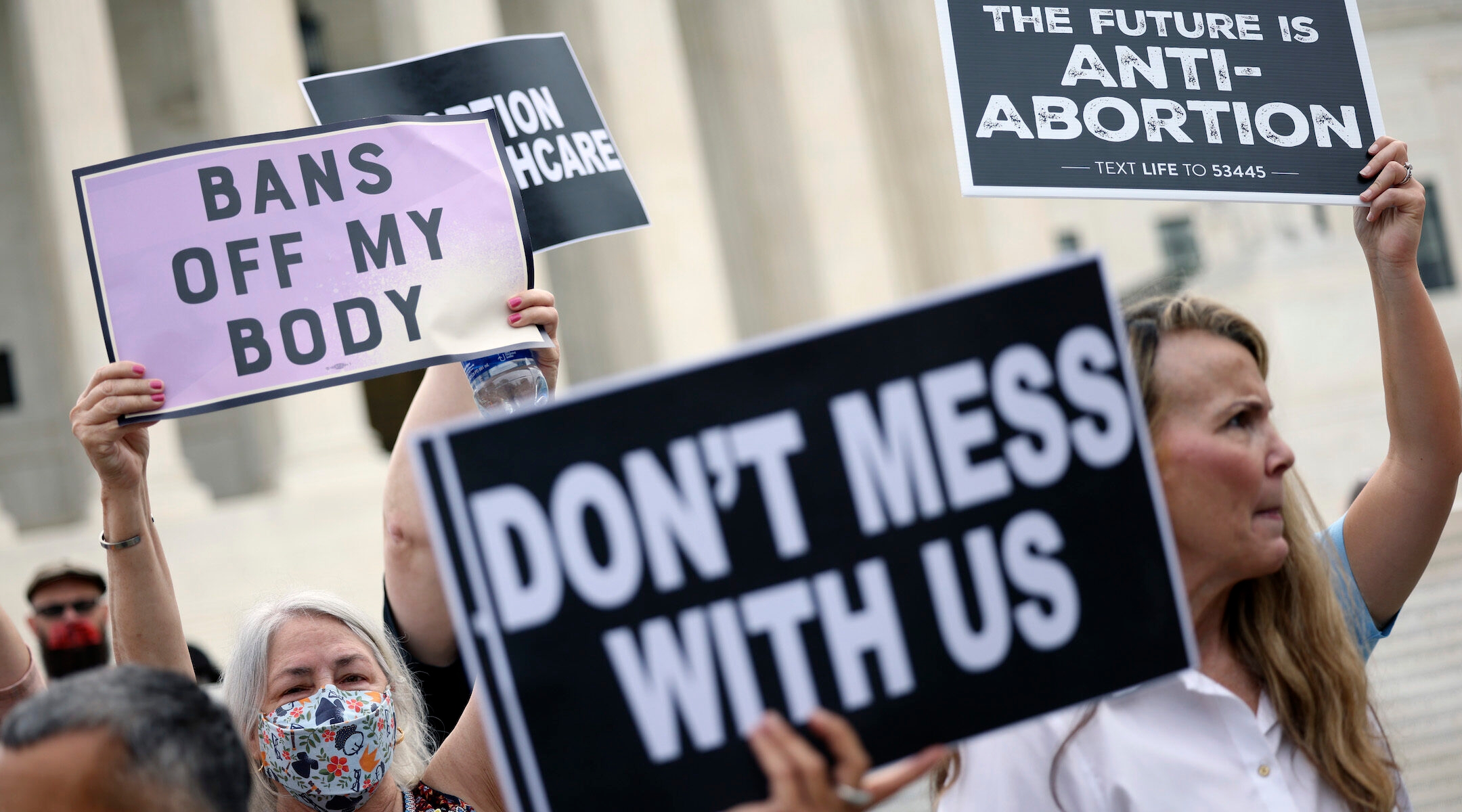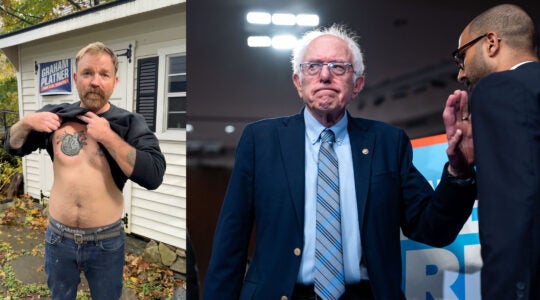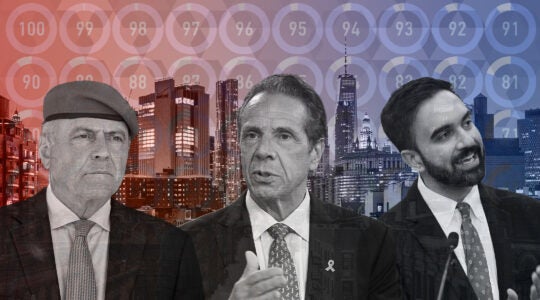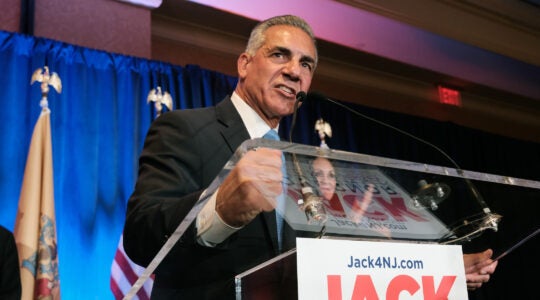WASHINGTON (JTA) — The Supreme Court opened a new session of cases this week, and an array of them affect Jewish life in the United States.
But there is one issue that a range of Jewish groups are keenly interested in that is not on the docket: the Court’s credibility.
A series of bruising confirmation battles in recent years and a pair of recent decisions — on Texas’ controversial abortion law and on President Biden’s proposed moratoriums on evictions in the wake of the COVID-19 pandemic — have polarized public opinion about the Court. In the wake of last year’s rush by Republicans to get Amy Coney Barrett confirmed as the Court’s sixth conservative justice, following the death of Ruth Bader Ginsburg, there have been calls from left-leaning groups to reconstitute the Court by adding more justices.
Sensing the growing criticism, several justices — liberal and conservative — have spoken out in recent weeks. Barrett emphasized that justices should not let personal biases influence their decisions. Samuel Alito dismissed claims that the Court’s conservatives have formed a “shadow docket” to push decisions through without traditional debate sessions.
That has not appeased many Jewish organizations, who worry about how erosion of the Court’s reputation could eventually harm Jews.
“There will be a time when the court’s prestige is necessary to protect individual or group rights or the institutional interests of the country, and the prestige shouldn’t be squandered,” said Marc Stern, general counsel for the centrist American Jewish Committee.
He cited as an example Cooper v. Aaron in 1958, when the school board in Little Rock, Arkansas, fearing anti-Black riots, sought to delay the desegregation ordered by the court several years earlier. The court unanimously rejected the school board’s bid.
Stern noted that at the time, desegregation was unpopular in the south, and President Dwight Eisenhower equivocated about federal intervention.
“What carried the decision was the prestige of the court,” he said.
Rabbi Jonah Pesner, who directs the Reform movement’s more progressive Religious Action Center, said recent court decisions have set it on a path toward radical changes, among them severely curtailing the right to an abortion.
“We are worried about the hyper-polarization of the Court and the potential that it is being delegitimized when it is so out of sync with thoughtful consensus issues, like access to abortion,” Pesner said.
Under that cloud, the Court’s justices will hear a range of impactful cases this fall. Here are the ones that Jews should know about.
The threat to Roe v. Wade
The Court has agreed to hear Dobbs v. Jackson Women’s Health Organization, pitting the state of Mississippi, which bans most abortions after 15 weeks, against an abortion clinic.
Lower courts — including those known to lean conservative — have upheld the abortion clinic’s claim that the law violates the seminal 1973 decision that upheld a woman’s right to an abortion, Roe. v. Wade, which held that abortions are legal until the fetus is viable, at between 22-24 weeks of pregnancy.
The National Council of Jewish Women is leading a friend of the court brief on behalf of the clinic, with some 50 organizations signed on, and the Religious Action Center and Anti-Defamation League have signed onto separate amicus briefs.
NCJW has launched an initiative, 73Forward (referring to the decision’s year), that will educate women about abortion and help facilitate access to abortions. It includes a component called Rabbis for Repro, now numbering some 1,500 rabbis, to underscore that for many Jews, access to abortion is a religious imperative.
“We are deeply concerned about laws that would severely limit access to abortion,” Pesner said. He said the laws particularly afflict segments of the population that do not have access to private care or the means to travel to states with more liberal laws.
Jody Rabhan, NCJW’s chief policy officer, said that by taking up the case the Court is signaling it wants to revisit Roe v. Wade — even though the Supreme Court does not usually take up cases that are not in dispute in the lower courts.
“It’s been in front of the Court for some time, but only after Amy Coney Barrett was confirmed did the Supreme Court decide to take up this case,” she said. “There was no reason to take up this case; there was no discrepancy in the lower courts.”
Another ominous sign for abortion rights advocates is that the Court recently let stand without hearing a Texas law that allows civilians to sue anyone who facilitates an abortion, although multiple experts said the Texas law was unconstitutional. (A federal judge temporarily blocked Texas’ enforcement of the law on Wednesday, siding with Biden’s Justice Department, which had filed an emergency request.)
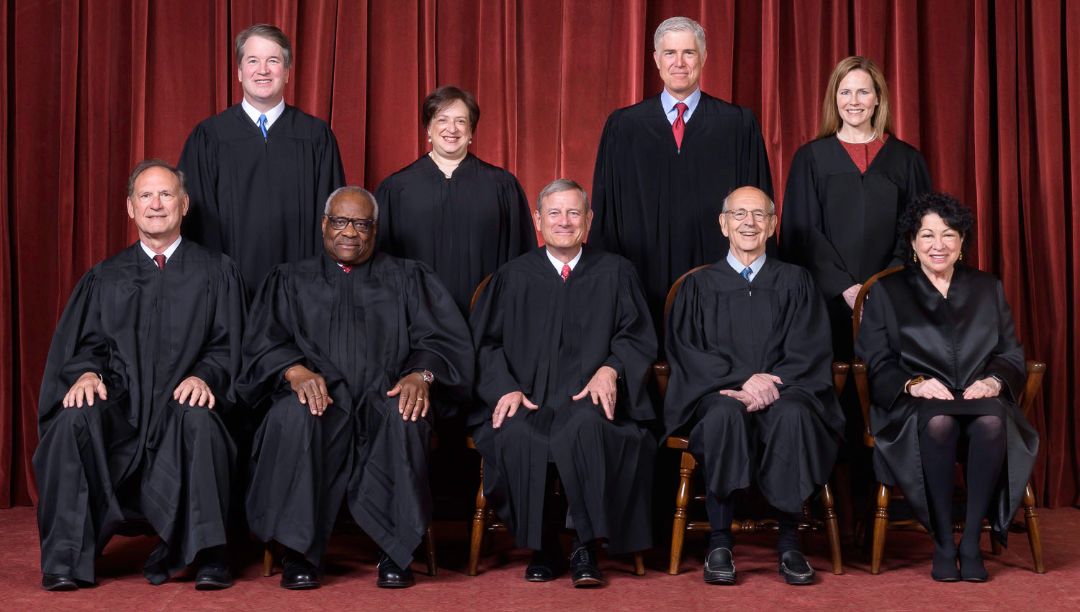
The Roberts Supreme Court in 2021. (The Supreme Court)
A Pissarro painting’s rightful place
In Cassirer v. Thyssen-Bornemisza Foundation, the descendants of a Jewish woman forced to give up a Camille Pissarro painting to Nazis for her freedom are seeking its restitution from its current owner, a state-owned museum in Madrid.
The case hinges on whether California or Spanish law applies here.
Spanish law allows an owner to retain stolen property if there was no reason at the time of purchase to believe it was stolen, and if no one comes forward to claim it within a given period of time. In the U.S., by contrast, there is no time limit for the original owner to reclaim stolen property.
Stern said the AJC is considering an amicus brief, in part because he would like the Court to consider an issue narrower than the thorny one of whether Spanish law supersedes U.S. law: if the museum is lying.
Stern does not believe the museum carried out due diligence when it acquired the painting in 1999, and may not be entitled to the painting even under Spanish law.
“You could write a brief like ‘no literate person could believe that this was not stolen,’” he said.
Paying for religious schools
Accepting a case involving the separation of church and state is the one sure way to get dueling Jewish amicus briefs before the Supreme Court. Carson v. Makin fits the bill.
In Maine, some parents want to use state funds to send their children to religious schools. Maine and Vermont are the only two states that allow parents of children in rural districts without a high school to opt out of sending their kids to a neighboring district’s public school. Instead, they can use state funds to send them to an in-district private school — unless that private school is religious.
The parents in Carson v. Makin say that this ban is unconstitutional.
The Orthodox Union has filed an amicus brief on behalf of the complainant parents, and the Anti-Defamation League is set to file an amicus brief on behalf of the state of Maine.
Steve Freeman, the ADL’s vice president of civil rights and director of legal affairs, said that court precedent allows public money to be spent on religious schools as long as it did not involve religious instruction — for instance, in the use of funds for a playground. He said the ADL, in its amicus brief, will join arguments that public money should not fund indoctrination in a faith.
Nathan Diament, the Orthodox Union’s Washington director, said that the distinction that the ADL is hoping the Court will uphold may be impossible to make: There is little that a religious institution instructs that is not founded in religious belief, even if the topic is ostensibly secular, he said.
Additionally, he said, it’s too late to stop public funding for religious institutions, noting as an example the decision last year to lend pandemic aid to religious institutions, which had bipartisan support.
The American Jewish Committee, once a reliable partner to the ADL and other Jewish civil rights groups in defending the separation of church and state, will not be weighing in, Stern said.
“There’s been a disposition within the agency to reexamine our position on aid to parochial schools,” he said.
The case of the Christian flag
The ADL and the AJC are both considering whether to weigh in on Boston’s rejection of a Christian group’s request to fly a Christian flag outside city hall, a case known as Shurtleff v. Boston.
The Christian group sued on free speech grounds because the city makes the flagpole available to local groups for a limited period of time. Excluding a religious group is discriminatory, the group argues.
The ADL’s Freeman said the case is “a slam dunk kind of question that flying a religious flag in front of City Hall is not consistent with what the framers had in mind when they adopted the First Amendment.”
The AJC’s Stern said a case could be made that flying a religious flag on public grounds amounts to an endorsement of faith, but he was also concerned that precedent might not be on the side of church-state separationists: Courts have for decades upheld the rights of Jewish groups (most frequently, the Chabad-Lubavitch movement) to position menorahs on public property during Hanukkah.
Heeding the kids from Parkland
In New York State Rifle & Pistol Association v. Bruen, a gun group is joining two individuals challenging a New York state law that only grants permits to carry concealed handguns outside the home if someone can show “proper cause” for a need for self-defense.
The Reform movement’s Pesner said his group has joined an amicus brief, in part because younger Reform Jews have made gun control a focus since the deadly 2018 shooting at a high school in Parkland, Florida. There were a number of Jewish victims killed in the attack, and local Jews in response took up gun reform advocacy through Reform-affiliated groups.
That advocacy was in part also motivated by racial equity, said Pesner. “Our young people in Parkland say they witnessed a horrific tragedy, but that event takes place every day in cities like Washington DC and Chicago and does not get the same attention.”
The case of the community college crank
In Houston Community College System v. Wilson, a former member of a community college’s board of trustees sued the board for passing a resolution censuring him for his relentless opposition to the board’s agenda. He allegedly leaked confidential information, filed lawsuits against the system and trolled the other members’ constituents with robocalls.
Wilson said the censure violated his right to free speech. A lower court said that the censure amounted to little more than a statement and threw out the case. Then an appeals court reinstated it.
So why is this the single case, so far, that the AJC is addressing in an amicus brief?
Stern said a ruling upholding Wilson’s claim — that the community college board limited his free speech — could have dire consequences for Jewish groups that call out instances of antisemitism. Government officials should have the freedom to call people out for bad behavior without being sued, he argued, and also linked it to the AJC’s efforts to get governments to embrace the International Holocaust Remembrance Alliance definition of antisemitism.
“If every time a government official called out antisemitism, he’s guilty of infringing free speech, that would be a severe setback,” Stern said.
Upholding the right of the undocumented to a hearing
The Court is hearing two cases, Garland v. Gonzalez and Jonson v. Arteaga-Martinez, in which undocumented migrants in detention who face dangers if they are deported to their homeland argue that they are entitled to a hearing after six months to determine whether they are eligible to be released on bond.
HIAS, the lead Jewish immigration advocacy group, is tracking the cases closely, in part because the Supreme Court has leaned in favor of continued detention in recent cases, said Andrew Geibel, the group’s policy counsel.
Geibel said the detainees are susceptible to COVID infection, are suffering mental health privations and are unable to adequately prepare for their defense while in detention.
JTA has documented Jewish history in real-time for over a century. Keep our journalism strong by joining us in supporting independent, award-winning reporting.
